Supplemental
Part Three

Photo of The Smiths by unknown photographer. Reproduced without permission.
This article is notable for having been published after Johnny Marr left The Smiths but before Morrissey went solo. Nancy Culp, the group's press officer for nine months in 1984, offers her own take on the Smiths' brief but spectacular career - and ponders a future for the group without Marr. Refreshingly candid, Culp pulls no punches here. Well worth a read, the odd factual clunker notwithstanding.
This item originally appeared in Record Mirror. The exact date of publication is unknown.
IT'S TIME THE TALE WERE TOLD...
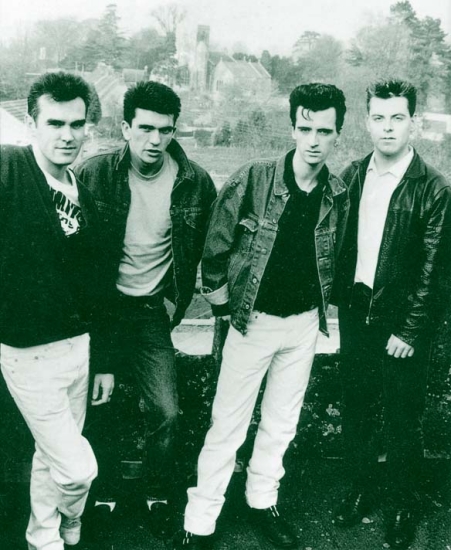
The lads get all deep and meaningful in one of the last publicity pics featuring Johnny Marr (Original caption)
Johnny Marr's departure signals the end of the first chapter in the history of the Smiths. As Morrissey, Andy Rourke and Mike Joyce prepare to carry on without him, this month will see the release of their fourth studio LP, 'Strangeways Here We Come'. Nancy Culp, who spent nine months as the group's press officer in 1984, looks back on their glittering career.
IN THE present climate of overnight pop success stories, the Smiths' rise to fame looks positively Rip Van Winklean in comparison. But back in late 1983, when they burst forth on 'TOTP', in a shower of gladioli, with the vital 'This Charming Man', they were proclaimed as being something of an overnight sensation.
Yet the Smiths were formed back in 1982, at a time when the charts were dominated by Dollar and their ilk. It took them precisely one year to break the hold.
Right from the start, there was a strong myth perpetrated about the strange Stretford lad Morrissey and his band. Legend has it that an 18-year-old Johnny Marr - then working in a clothes shop - first met Morrissey when the former turned up uninvited at the latter's bijou Whalley Range residence, which he shared with various members of experimentalist band Ludus. Johnny, intrigued by Morrissey's strange reputation, hammered on the door until he was let in. Once inside, he motormouthed his way into a songwriting partnership which has produced some of the most touching, funny and musically refreshing songs of this - perhaps of any - decade.
After roping in old schoolfriend Andy Rourke on bass and veteren of several dead end bands Mike Joyce on drums, the simply named Smiths were born.
Their debut gig was on October 4, 1982 at Manchester's Ritz club, supporting Blue Rondo A la Turk. Blue Rondo were that year's hipper than hips, and have long since faded into obscurity. Yet just seven months later, after riding out the bidding war indulged in by bloodhungry majors, the Smiths were snapped up by Rough Trade (although technically, they never actualy signed to them until 1985).
Their first single, 'Hand In Glove', appeared in May 1983. With its rolling guitars and mountain top vocal, it tore itself a place in the indie charts, becoming something of an anthem for the group. Immediately, the press went mad for them, and they were championed by various journalists as the new musical saviours.
Wider commercial success, not to mention their unbridled use of the now cliched flowers, came with 'This Charming Man'. Morrissey's florid and sometimes grammatically liberal use of words was to become his hallmark, not only in his lyrics but also in interviews. He ranted vociferously against the traditional road to success, about sex (or rather about the lack of it) and about relationships, you name it - Morrissey was there making dramatic statements on the subject.
With 'This Charming Man' the press onslaught reached full tilt. Come January 1984, with the release of the haunting 'What Difference Does It Make', you couldn't pick up a pop paper without being treated to the expostulations (Morrissey liked words like that) of music's first public agnostic, celibate vegetarian.
THE DEBUT album, spartanly entitled 'The Smiths', was greeted with elaborate verbal garlands. Even Morrissey himself, on a live 'Tube' programme, proclaimed it as being "A complete signal post in the history of popular music".
With hindsight, this debut album is still exciting, even if at times John Porter's usually sympathetic production becomes heavy and laboured. 'Suffer Little Children' and 'Pretty Girls Make Graves' sound particularly leaden in comparison to the heady surge of 'Still Ill' and 'Miserable Lie'. Shame, too, that the stage favourite, 'Barbarism Begins At Home', didn't make it onto this LP, since it would have added a much needed lighter touch to the proceedings.
So, 1984 was to be the year for the Smiths. 'Heaven Knows I'm Miserable Now' gave way to the sparkling 'William, (It Was Really Nothing)', until their piece de resistance, 'Hand In Glove', the long mooted single with Sandie Shaw, shot the band into the charts yet again. Giving her a boost and them even more credibility, it proved once and for all that the songwriting team of Morrissey/Marr could produce stuff worthy of more traditional interpretation.
Looking back, it's hard to fully describe the band's impact on the drab scene of 1984. It was left to them and, to a lesser extent, Frankie Goes To Hollywood, to liven up the weekly charts. From the hearing aid homage to Johnny Ray to the daffs in the back pocket; from the full blown monster of a tree in the baggy jeans to that finest hour when Morrissey ripped off his baggy shirt to reveal the words 'Marry Me' scrawled by yours truly across that oft bared chest in my black eyeliner pencil. Yep, whenever the Smiths appeared, it was always an event.
In the long wait between the first album and its successor 'Meat Is Murder', which wasn't released until February 1985, a collection of B-sides, rare tracks culled from Peel/Jensen sessions and 12 inch bonus tracks were released. 'Hatful Of Hollow' arrived at the tail end of '84, and was a sort of 'Best Of'. In it, the ingenious Smiths finally developed into the big time boys we know today. Clad as ever in an immaculately tasteful (Morrissey designed) sleeve, it featured one of the band's most innovative tracks, 'How Soon Is Now?'. Running over seven minutes, this hypnotic, seductive song was evetnually released as a single after topping John Peel's Festive 50. It didn't do quite as well as some of its predecessors, though, perhaps because it was something of a departure from the formula. [That the song had already appeared on the flip side of the 'William,...' single, and on 'Hatful Of Hollow,' arguably did the single's chance of chart success greater harm - BB]
At last, though, 'Meat Is Murder' arrived. Self-produced, it is in some ways the epitome of the Smiths' sound, taking Johnny's versatile guitar style and Morrissey's various lyrical fetishes to their logical conclusion. [I agree - BB] It is curious, though, to hear a grown man singing about being beaten up by teachers as if he's only just stepped out of senior school. Having said that, the lyrics are some of his best.
'Meat Is Murder' is a hard-hitting LP, dealing with violence in various guises. The title track is Morrissey's pro-vegetarian soapbox par excellence, which simply dares you, amidst the dying screams of cows, to take one more bite of that McDonalds.
THE TAIL end of '85 saw a clutch of fine singles, from a band whose sound was rapidly veering towards downright pop. Having mastered the colourful, jingly-jangly guitar style which inspired a million shamblers, Johnny started to bring in more classically flavoured instruments to augment the sound, not dissimilar to the way Andrew Loog Oldham had revitalised the Stones. 'The Boy With The Thorn In His Side' emerged; a historical crossroads for them since it was accompanied by their first ever video.
Originally, Morrissey had ranted loud and long against those of his contemporaries who felt the need to prop up their songs with elaborate promos. And, however basic their debut video may have been, a lot of fans felt that the Smiths' lust for stardom had overtaken their early high ideals.
By now, the Smiths had transcended the usual indie band expectations. They were the first to be regulars on 'TOTP', and they sold out huge tours and vast amounts of records without signing to a major (although their records were sold by the London Records Strike Force and they had Ferret And Spanner, top pluggers, working for them).
Yet all of this occured with the minimum of professionalism on their part - the band having become notorious for blowing out gigs, tours, TV shows and interviews at the last moment. In some ways, it's a wonder that they survived with such an attitude. But they have something which few others have - an almost indefinable quality and charisma.
October 1986 heralded the arrival of their third studio album, 'The Queen Is Dead'. It was accompanied by the usual hysterical press acclaim and unprecedentedly long and verbose interviews with the man whose ability for spinning tall tales was matched only by his ability to believe them himself. If it's time the tale were told... you'll sure as hell never get it from the sugary lips of Steven Patrick.
'The Queen Is Dead' - a characteristically self-deprecating and humourous title if ever there was one - veered from the sublime 'There Is A Light' to the ridiculous music hall romp of 'Frankly, Mr Shankly'. At this juncture, the Smiths were attracting a far wider audience - large sections of earlier Smiths devotees having left them behind for newer fads. Musically, the album strives for a diversification from previous records and largely succeeds, even if the good old formula is still lurking around underneath all the orchestral bluster!
'The Queen Is Dead' was accompanied by a tour in which the by now seasoned veterens of US touring showed an alarming tendency to rock'n'roll overkill. They were also having numerous line up increments, namely featuring their on/off relationship with second guitarist Craig Gannon. Craig was also brought in when Andy Rourke's heroin problems became particulary problematic. Around the same time, Mr Marr was increasingly seeking the company of some of rock's older vanguards, his prodigious talent at long last receiving its due recognition.
EARLY IN 1987, after a seemingly endless state of dissatisfaction with good old Rough Trade, the Smiths jumped contract and signed to EMI for an alleged one million pounds. But they remained contracted to RT, so went on to release 'Panic', 'Shoplifters Of The World Unite' and 'Sheila Take A Bow' before the final single, 'Girlfriend In A Coma', put the light out on that relationship.
No one could say for certain why the always precarious relationship between the Smiths and RT finally broke down. Probably, it was a case of both sides having irreconcilably different ideas on how to achieve their goals.
Once again, in the interim between studio albums, a second best-of collection entitled 'The World Won't Listen' was released. But, not long after its appearance, and just before the release of their last studio album for RT, 'Strangeways Here We Come', Johnny Marr announced his intention of leaving the group.
It has been rumoured that, during the recording of 'Strangeways', relations between Morrissey and Johnny had deteriorated beyond repair. Johnny had taken on a personal manager, choosing the very same man who Morrissey had sacked as their representative the previous year. Increasingly, too, Johnny had worked with other artists, such as Bryan Ferry and Keith Richard. The two of them were obviously growing apart.
Morrissey says he is determined to carry on with the Smiths, bringing in a new guitarist. But the conundrum remains; how do you replace the irreplacable?
Undoubtably, it will mean a new musical direction for the Smiths, and Morrissey, being the almost irrationally cautious person that he is, will probably take some time before choosing someone else who he feels comfortable writing songs with.
But, if he has enough faith in himself and the remaining members, there's no reason why the Smiths shouldn't continue. Then again, no one would be surprised if, in three months time, he blew the whistle on the group and went solo. Morrissey is probably the most professionally perverse person you're ever likely to encounter!
Whatever the future may hold for Morrissey, Mike, Andy and Johnny, the fact remains that the Smiths have produced some of the finest songs ever to emerge on vinyl. No one will ever be able to take away the fact that they are one of the most important - and idolised - bands to emerge in the history of music.
Reprinted WITHOUT PERMISSION for non-profit use only. Photo by Pat Bellis. Reproduced without permission.
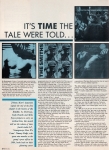
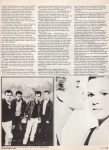
Click to enlarge original pages
News item from New Musical Express detailing the break-up of The Smiths.
GOODBYE, SMITHS
GROUP SPLITS, MORRISSEY TO GO SOLO
THE SMITHS are dead. After weeks of speculation about a replacement for Johnny Marr, NME discovered at the weekend that Morrissey intends to record under his own name in the future.
His new songwriting partner is Stephen Street, the producer and engineer who has worked with The Smiths since the Sandie Shaw collaboration in March, 1984.
And it's now more than likely that the two remaining Smiths - drummer Mike Joyce and bass player Andy Rourke - will team up with Johnny Marr in his new band.
The news started to break on Friday when the NME received a statement from Joyce announcing his departure, saying he had "fulfilled his role" with The Smiths.
Rough Trade and The Smiths' office were unaware that Joyce intended to quit, as he had been approached by Morrissey to play on his solo material.
The full truth was revealed on Saturday by Pat Bellis, spokesperson for Morrissey: "It's taken some time to think things over, but now Morrissey had decided to end one era before beginning another.
"The Smiths were Morrissey, Johnny, Andy and Mike. Any other combination would not have been the same, so the auditions to replace Johnny were never taken really seriously. They just tried out a few people suggested by friends.
There was a tremendous pressure on Morrissey when Johnny left, and he knew it would be a difficult task to replace him."
Morrissey has already recorded a couple of songs with Stephen Street in demo form and is said to be happy with the results. Product may be in the shops before the end of the year, on EMI.
Pat Bellis added that Morrissey will not be appearing in Brookside, as earlier suggested, although the thought of being Henry Cross's neighbour was very appealing.
Joyce's statement said he would be soon working with other musicians, and sources in Manchester say it is likely he will link up with Marr, and Rourke will probably tag along.
Marr's first recorded product since he quit The Smiths will be out next month. He plays guitar on the new Bryan Ferry LP, as yet untitled, and has co-written one of the songs with the singer. Ferry has also recorded a vocal version of The Smiths' 'Money Changes Everything' instrumental, which will not be on the album, but may surface as a B-side sooner or later.
So, the new Smiths album 'Strangeways here We Come', released later this month, will be the last we hear from the band, unless negotiations with Rough Trade to release a live album are successful. The label wants to issue an LP from the Kilburn National Ballroom show last year, the tapes of which belong to the BBC.
Morrissey and Marr are still both signed to EMI as individuals, but the label will now never release a Smiths record.
Nick Gatfield, head of A&R at EMI, was not available for comment at the time of going to press. He was at the company's annual sales conference, the same conference where The Smiths' signing was announced last year.
New Musical Express, September 1987
Reprinted WITHOUT PERMISSION for non-profit use only. Photo by Paul Slattery. Reproduced without permission.

Original photo captions reads: Split Smiths: Morrissey holds the wreath. Joyce (left) and Rourke (right) to join Marr? Maybe.
Photo of The Smiths by Paul Slattery
SEE ALSO: Smiths Split! and Smiths Split Confirmed
The following three news items cover the two-day Smiths symposium held at Metropolitan University's Institute Of Popular Culture, Manchester, in April 2005.
Academics study The Smiths
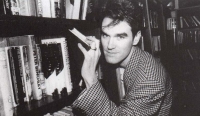
Iconic 80s band The Smiths are to be studied by some of the world’s leading academics during a special conference.
The famous Indie quartet, credited with putting the ’miserable’ in Manchester, will be analysed, constructed and deconstructed by scholars from around the world during a three-day conference in their home city next week.
The Smiths were the most influential of Indie bands in the 80s spawning thousands of bequiffed fans in floral shirts, copying frontman Steven Patrick Morrissey.
They have been described as the quintessential English pop group, with a string of hits bemoaning late-teen angst.
During the symposium, entitled ’Why Pamper Life’s Complexities’ – a line from the song This Charming Man, academics from across the globe will explore some of lead singer Morrissey and his band’s lyrics and music from the literary and cultural points of view.
Dr Justin O’Connor, an expert on the Manchester music and cultural scene, said: "The Smiths have had a singular impact on popular culture.
"They looked like nobody else and sounded like nobody else, and their music had an emotional depth that moved people in a way that no band has managed before or since.
"In spite of their enormous cultural significance and personal resonance, The Smiths have yet to receive sustained academic attention.
"This conference aims to put that right and to critically examine what the band meant and continue to mean two decades after their untimely demise."
Among the themes addressed at the conference are: gender and sexuality, race and nationality, a sense of place, the imagination of class, aesthetics, fan cultures and musical innovation.
It takes place at Manchester Metropolitan University on April 8 and 9.
IrelandOn-Line, March 28, 2005
Reprinted WITHOUT PERMISSION for non-profit use only. Photo of Morrissey by Tom Sheehan. Reproduced without permission.
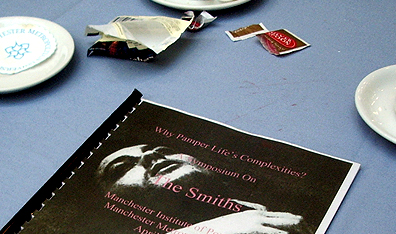
The 'Why Pamper' programme guide
Photo by Craig Taylor. Reproduced without permission.
Meeting is murder
Academics and fans gathered in Manchester this month to dissect the impact of the Smiths. GRACE DENT hears tortured tales of dead dogs, bisexual love triangles and lonely youths.
Inside the registration hall, in a sea of greying quiffs, chunky glasses and blazers, a coffee morning for the chronically shy is in full swing. Today at the Manchester Institute for Popular Culture, an academic symposium on the music of the Smiths is underway. Cups and saucers clatter nervously in trembly hands as the 150 mild-mannered Morrissey-fixated academics are forced to mingle and munch ginger snaps. "I had this old battered VHS tape of the Smiths' 1987 South Bank Show special," one doctor of sociology confesses, "and it got to the stage where I couldn't function unless I watched it every day before school. In the end I could recite the whole show wordperfectly. Even Melvyn Bragg's links."
I nod furiously in empathy, remembering the solemn teenage day my brother taped over my own revered South Bank Show tape with Teen Wolf 2. As a Morrissey disciple, I was annihilated. It felt like he'd dried up with the Turin Shroud. In shadowy corners, academics avoid eye-contact, burying their faces in course hand-outs and lurking behind potted fronds, praying that don't have to make small talk about their papers sporting titles like Irish Blood, English Heart: Nationality, Subjectivity And The Smiths, or Hand In Glove: The Politics Of Gender In Smiths Sleeves.
Yet despite people's nerves, there's a genuine mood of excitement. For the 150 academics and superfans from all over Europe, America and Australia, this symposium, entitled Why Pamper Life's Complexities?, is the logical conclusion of 20 years of box-bedroom philosophising, arm-flailing, feigning enjoyment of Oscar Wilde and analysing the cryptic messages in the run-out grooves of Smiths 12-inches.
"The Smiths had such a lyrical complexity and richness," a doctor of history tells me, as we're chivvied into our first lecture. "No other band had such a cultural resonance or are more worthy of academic study." I agree with him totally. Although as we take our seats and TV crews and tabloid photographers surge around us, I've a sneaking suspicion that to the non-Smiths fan we probably look as intellectually valid as Trekkies at a Klingon Institute GM, or the jewelled-glove-waving buffoons camped outside Michael Jackson's courtroom.
Lectures begin with some emotive words from course co-organiser Dr Fergus Campbell, on the life-changing teen properties of finding the seven-inch of William It Was Really Nothing for 20p in a Woolworths bargain bin, before playing it endlessly in his Carlisle bedroom, "as the rain poured down on a humdrum town". This won't be the last time Moz's lyrics will pepper the lectures - it seems there's a one-liner to prove most theories. Yet just as the Morrissey love-in becomes dangerously cloying, author Dave Haslam takes the podium, arguing that Morrissey's musical standards nose-dived post-Marr due to his inability to move with the times. A deathly silence fills the room.
"I have issue with that!" fumes one academic, grabbing the roaming mic. "Morrissey isn't flawed. Francis Bacon refined the same concept throughout his life and he's considered genius. What about Picasso?"
"Ah," replies Haslam, "but Bacon refined his idea to perfection. This isn't the case."
A bitter debate ensues as academics wade in quoting Simon Frith, Simon Goddard and FR Leavis. Luckily, Haslam's time is up before he's egged, or forced at gunpoint to declare Vauxhall And I an all-killer, no-filler classic. Weirdly, a lot of the Moz devotees, after a lifetime's service, appear to have taken on many of his trademark characteristics, seeming perilously thin-skinned, pedantic about detail and media-paranoid. Few agree to chat to me without deliberating for hours beforehand about how they might be portrayed, or whether they believe I'm truly a Smiths fan. And what am I going to write? No, exactly. Can I fax them the copy before it's printed? And why are you writing it anyway? Being with them is quite exhausting. By coffee-break time, I've begun hiding behind fronds too, avoiding all eye contact. Particularly from one Brylcreemed fortysomething who keeps joking in a ha-ha Rohypnolly way that he's going to pull me at the Smiths disco tonight.
In the smaller seminars, I opt for the talks on Manchester And Identity, where there's clips of BBC Manc comedy Early Doors and discussions on Morrissey's love of kitchen-sink drama and Coronation Street. There's a lecture from a man who claims to be Moz's second cousin about "re-mapping Hulme using psychogeographics", followed by a rather inaudible talk from a woman with a geometric bob about the architectural influences on Morrissey's lyrics. As slides of bleak train tracks, wrought iron gates, graffiti-strewn railway bridges and bird-poo-splattered walls flash up on the screen, the academics scribble notes for an imaginary exam. "Oh God," groans Damian, 35, from Manchester, shuffling uncomfortably, "not the iron bridge."
Years ago, Damian organised Smiths conventions, the highlight being a coach trip around all of these sacred sights. Damian's nightmares are still clouded by images of the highly-strung, mainly Japanese female clientele deriding his map-reading skills. "Once, I took a wrong turning in a housing estate in Stretford and totally lost Moz's primary school. It was terrible. I drove round and round, getting more and more lost, with a coachload of Japanese women sobbing and screaming abuse. I tried to assuage them with an iron bridge in Salford, the one Morrissey talks about in Nowhere Fast [Actually 'Still Ill' - BB]. They all jumped off the bus and began hugging and kissing it, then wouldn't get back on. I decided to get a proper job soon after that."
At the reception to round off day one, tepid glasses of vin de table are eagerly grabbed and the delegates loosen up, going from seriously sober, to red-faced and loose-lipped within two to three sips. "Morrissey knows my name," Hugh Clarke from west Lothian tells me, with conviction. "'Hello Hugh,' he said. 'Hello Hugh!' That was my life made!"
Meanwhile, Peter Finan (2003 Mastermind semi-finalist, specialist subject the Smiths 1982-1986) is forcefully rounding people up for the Smiths disco at the Star & Garter, where they play an eclectic mix of everything from Hatful Of Hollow to Suedehead.
"Do they play anything else but Smiths," I ask a small timid bloke in jam-jar glasses. "What about Morrissey-influenced tracks? Y'know, like the Killers?"
The man looks bewildered. "No," he says, becoming a little agitated, "it's a Smiths disco. They just play the Smiths. Why would they play Killers? Why would they do that? Modern music is rubbish."
Later, the dancefloor at the Star & Garter erupts to This Charming Man, T-shirts are ripped off and man-boobs exposed, homemade flags waved, thirtysomething men star-jump off chairs to The Queen Is Dead and exacerbate their grumbling hernias. As the delegates become more oiled by alcohol, some turn rather maudlin, like Gavin, 25, from Doncaster. "I love Morrissey," Gavin says, solemnly. "Even when I'm alone, on the dancefloor or in my room, I don't feel alone as he's my friend."
As Gavin wanders away, wrapped in his flag, I suddenly realise what my friends and I looked like aged 16, with our constant woeful moans about "invisible friends", "loneliness" and "outsiderness", flouncing about in Meat Is Murder T-shirts, sulking about the injustices of factory farming and dropping hints of suicide. No wonder we got beaten up. I would beat us up now.
At 10am sharp the following morning, with several hungover faces in the auditorium, lectures recommence with papers on Morrissey's interpretations of class, politics and gender. Professor Sheila Whitely from Salford University delivers a gripping address, dissecting the dark sexual tone within Reel Around The Fountain and This Charming Man, which appears to pre-empt "dogging" with its talk of desolate hillsides and cold leather seats. The lectures go on and on, touching on musicology, poetic theory, artwork and gender issues. The question-and-answer sessions take an increasing "share and scare tone", with people queueing up to reminisce about dead dogs, bisexual love-triangles and their lonely misunderstood youth.
As the weekend draws to a close with a performance by covers band the Smyths, then a coach tour, only one opinion on Morrissey's work is missing from the melee - and that's from the man himself. Not a word has come from Los Angeles. Not even one of his infamous faxes. "Oh he knows it's happening," one woman tells me, as we queue outside Salford Lads Club for a souvenir picture, watching the fake Morrissey, aka Graham from the Smyths, posing for the camera. "OK, I have no evidence, but I know he knows. It's so like Moz to feign indifference. I bet he's at home following it all, though. And loving every minute."
The Guardian, April 23, 2005
Reprinted WITHOUT PERMISSION for non-profit use only.
Oxbridge, here we come
Two decades after they split, The Smiths go to university
"The first serious academic study of '80s indie legends The Smiths took place in the band's home town of Manchester last month, attracting media interest across the board, from Channel 4 News to the front page of The Times. The two-day symposium at Metropolitan University's Institute Of Popular Culture proposed an in-depth theoretical analysis of both the Morrissey/Marr songbook and the group's broader cultural and social impact.
"There were one or two conservative journalists who misunderstood what we were about and spewed out the old cliches about 'boffins' and pop", says Cambridges's APU's Sean Campbell, one of three lecturers who organised the symposium. "But our aim was to bring together a whole range of people - academics, journalists and fans - who had something to say about The Smiths, and to facilitate a lively exchange of views. The Smiths' memory is too important to be left to the pseudo-experts on TV nostalgia shows. The cliched caricature of the 'miserabilist' Smiths really misses the point. For those of us that met the band and saw them live, The Smiths conveyed humour, warmth and intelligence, producing jubilant music and complex lyrics. In recognising that, the conference was far more successful than we could possibly have imagined."
Among the symposium's guest speakers were former NME writers Dave Haslam (author of Manchester, England and Not Abba) and John Harris (author of The Last Party and So Now Who Do We Vote For?), the latter presenting an entertaining, provocative and all too convincing argument mourning "the death of British rock" in the wake of The Smiths' demise.
The closing keynote speech came from Uncut's own Simon Goddard (author of The Smiths: Songs That Saved Your Life) and focused on the roots of Morrissey and Marr's music, treating those assembled to brief examples of some extremely rare outtakes.
A selection of the papers presented will be published later this year.
Uncut, June 2005
Reprinted WITHOUT PERMISSION for non-profit use only.
See the original item here